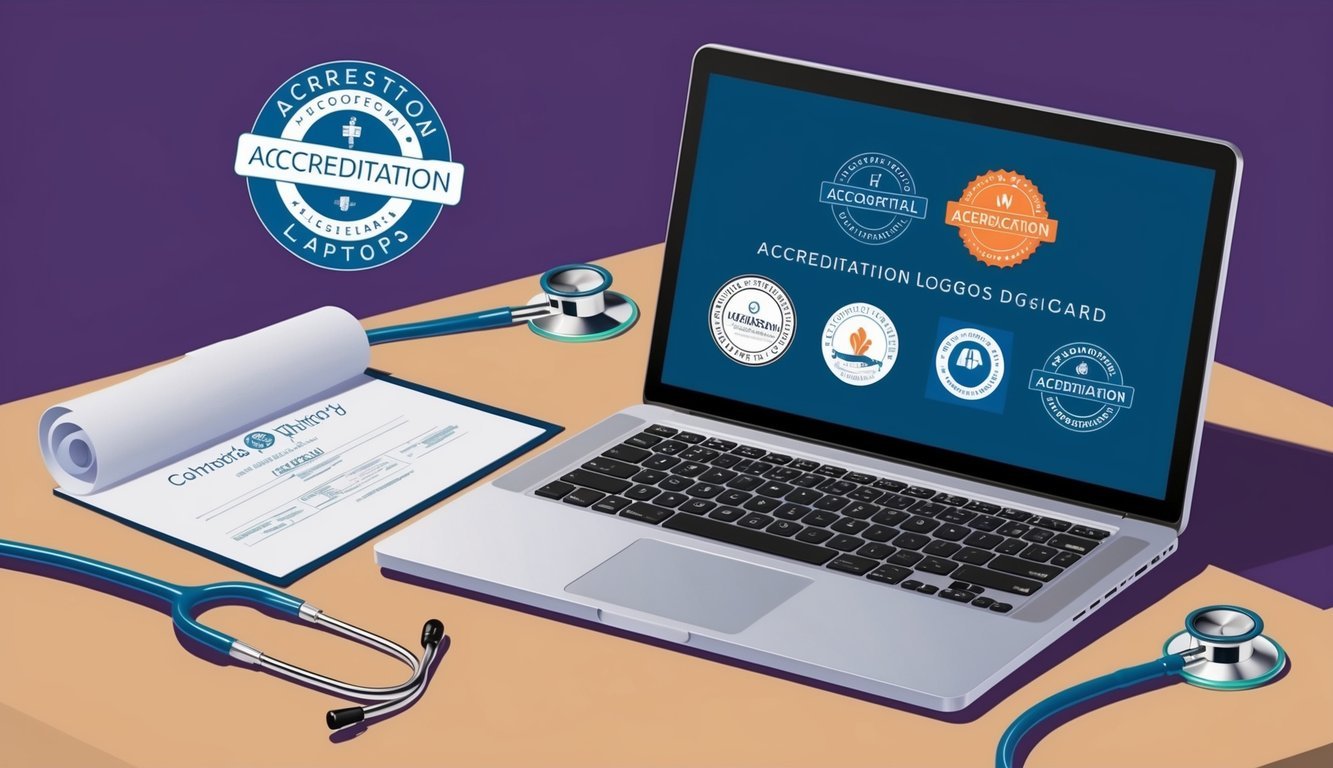In today’s evolving healthcare landscape, pursuing a career as a Family Nurse Practitioner (FNP) offers exciting opportunities to make a significant impact on patient care. Online Family Nurse Practitioner programs provide the flexibility needed for busy professionals to advance their education while maintaining their work-life balance.
These programs allow you to build on your nursing experience and develop the skills necessary to provide comprehensive care to diverse patient populations.
As a licensed Advanced Practice Registered Nurse (APRN), you will play a crucial role in healthcare delivery, diagnosing and treating patients while managing their overall wellbeing.
Many online programs not only provide the theoretical knowledge needed but also incorporate in-person clinical rotations, ensuring that you gain essential hands-on experience.
With the demand for healthcare services increasing, enrolling in an online FNP program puts you on a pathway to a rewarding career in nursing education and practice.
Choosing the right program is essential for your academic and professional growth.
Several accredited institutions, such as WGU and Chamberlain University, offer specialized curriculums tailored to the needs of aspiring nurse practitioners.
Explore these opportunities and take the next step toward enhancing your qualifications in the nursing field.
Exploring Online FNP Program Structure
Online Family Nurse Practitioner (FNP) programs offer flexible paths toward advancing your nursing career.
Understanding the structure of these programs can help you navigate admission requirements, curriculum, and clinical experiences.
Enrollment and Admissions Criteria
To enroll in an online FNP program, you typically need a Bachelor of Science in Nursing (BSN) and an active, unencumbered RN license.
Many schools, such as those listed by Nurse.org, allow you to start your studies without requiring the GRE.
Admission processes usually involve submitting transcripts, letters of recommendation, and a personal statement outlining your career goals.
Some programs may also require a minimum GPA, typically around 3.0, and relevant nursing experience.
Curriculum Overview
The curriculum in an online FNP program is designed to prepare you for clinical practice in family medicine.
Generally, you’ll complete core courses that include advanced health assessment, pathophysiology, pharmacology, and family health management.
Programs like those offered by WGU emphasize a mix of theoretical knowledge and practical skills.
You may also have the option to choose electives that align with your areas of interest, whether geriatric care, pediatrics, or women’s health.
Clinical Hours and Rotations
Clinical experience is crucial in FNP programs, typically requiring 500 to 750 clinical hours.
You will engage in hands-on practice in various healthcare settings, including clinics, hospitals, or community health centers.
Many programs help facilitate these clinical placements, allowing you to gain experience while earning your degree.
These hours are essential to prepare for the NCLEX-RN and future independent practice roles.
On-campus Requirements
While many FNP programs are designed to be completed online, some may require on-campus visits for orientation, skills labs, or specific courses.
This brief residency provides opportunities to enhance practical skills and engage directly with peers and faculty.
You should check each program’s requirements.
Institutions like Baylor University clearly outline their on-campus components, ensuring you are well-prepared for any in-person commitments.
Distance Learning Technologies
Online FNP programs utilize various distance learning technologies to enhance your education experience.
These may include video lectures, interactive discussions, and online resources that support learning and collaboration.
Platforms commonly used include Learning Management Systems (LMS) where you can access course materials, submit assignments, and participate in discussions.
Effective engagement with these technologies is crucial for success in an online learning environment.
Additionally, programs may offer technical support to assist you in navigating these platforms effectively.
Key Components of FNP Education
A comprehensive understanding of key components in Family Nurse Practitioner (FNP) education is essential for effective practice.
The following areas focus on critical knowledge and skills necessary for advanced nursing roles.
Advanced Pathophysiology
Advanced Pathophysiology provides you with an in-depth understanding of the physiological mechanisms that underpin diseases.
This knowledge is crucial for diagnosing and managing chronic conditions, as well as for interpreting clinical data accurately.
You will study cellular processes, genetic factors, and the impact of environmental influences on health.
The curriculum often emphasizes the integration of pathophysiological concepts into clinical practice.
This helps you apply theoretical knowledge to real-world scenarios effectively.
Familiarity with common disease processes, such as diabetes and cardiovascular diseases, is a priority.
This enables you to recognize manifestations and make informed decisions regarding patient care.
Health Promotion and Disease Prevention
Health Promotion and Disease Prevention focuses on strategies that enhance patient well-being and reduce health risks.
You will learn to assess individual and community health needs and develop appropriate interventions.
Key components include understanding health behaviors, lifestyle choices, and socio-economic factors that influence health outcomes.
Effective communication and patient education are vital in this area.
You will be trained to implement programs that promote healthy living, as well as preventative measures for conditions like hypertension and obesity.
This proactive approach is essential in your role as an FNP.
Advanced Pharmacology
Advanced Pharmacology covers the principles of medication management necessary in your clinical practice.
Understanding pharmacodynamics, pharmacokinetics, and the therapeutic effects of drugs is essential for safe prescribing.
You will study various drug categories, their indications, contraindications, and potential side effects.
Emphasis is placed on tailoring pharmacological interventions based on patient-specific factors, such as age, weight, and comorbidities.
Additionally, this component prepares you for discussions with patients about medication adherence and education.
This ensures they understand their treatment plans and potential side effects.
Diagnostic Reasoning
Diagnostic Reasoning is integral to your ability to evaluate and synthesize patient data effectively.
This skill allows you to formulate differential diagnoses and develop appropriate care plans.
You will learn to utilize health assessments, diagnostic tests, and clinical guidelines to make informed decisions.
A systematic approach enhances your ability to interpret findings and prioritize patient concerns.
Critical thinking is emphasized, enabling you to navigate complex clinical situations confidently.
Strong diagnostic reasoning skills lead to improved patient outcomes and better healthcare delivery.
Accreditation and Quality Standards

When selecting an online family nurse practitioner (FNP) program, understanding the role of accreditation is crucial.
Accredited programs adhere to rigorous educational standards, which can impact your education and future career.
Here’s a closer look at the importance of program accreditation and how it affects nursing school programs.
Understanding Program Accreditation
Program accreditation is a formal recognition process where educational institutions are evaluated against specific standards set by accrediting bodies.
For nursing programs, the American Nurses Credentialing Center (ANCC) plays a significant role in accrediting nurse practitioner programs.
Accreditation can be institutional or program-specific.
Institutional accreditation evaluates the overall educational institution, while program accreditation focuses on the specific nursing curriculum. Key accrediting bodies include:
| Accrediting Body | Focus Area |
|---|---|
| ANCC | Nurse Practitioner Programs |
| CCNE | Baccalaureate and Graduate Nursing Programs |
Being part of an accredited program ensures that the education provided meets the necessary quality benchmarks, preparing you for licensure and practice.
Importance of Accredited Nursing School Programs
Choosing an accredited nursing school program is vital for several reasons.
First, it impacts your ability to secure federal financial aid and grants.
Many financial assistance programs only fund students enrolled in accredited institutions.
Second, graduation from an accredited program is often a prerequisite for licensure exams and certification.
Most employers prefer hiring graduates from accredited programs, which can enhance your job prospects.
Lastly, accredited programs typically offer a curriculum aligned with current healthcare standards.
Graduates emerge well-prepared to meet the challenges of the healthcare environment.
Therefore, selecting an accredited FNP program is essential for your professional development.
Specialization and Advanced Practice Areas

Understanding the various specialization options within online family nurse practitioner programs is crucial for your career development.
Two prominent areas of focus include Pediatric Nurse Practitioners and Adult-Gerontology Primary Care Nurse Practitioners. Each specialization has unique responsibilities and educational requirements.
Pediatric NP – Primary Care
As a Pediatric Nurse Practitioner (PNP), you will provide comprehensive healthcare to infants, children, and adolescents.
Your responsibilities include conducting assessments, diagnosing conditions, and developing treatment plans tailored to young patients.
Key Aspects of Pediatric Practice:
- Developmental Assessments: Evaluating growth milestones and developmental stages.
- Preventive Care: Administering vaccinations and educating families on health maintenance.
- Chronic Condition Management: Managing conditions like asthma and diabetes in children.
Education typically includes a Master of Science in Nursing (MSN) with a focus in pediatrics.
Online family nurse practitioner programs often have tracks available for this specialization.
Explore more about this path through resources like NursingProcess.org.
Adult-Gerontology Primary Care NP
An Adult-Gerontology Primary Care Nurse Practitioner (AGPCNP) specializes in the healthcare of adults, including elderly populations.
In this role, you will focus on managing acute and chronic illnesses within a primary care setting.
Key Responsibilities:
- Comprehensive Assessments: Monitoring health changes in older adults to provide appropriate interventions.
- Chronic Disease Management: Coordinating care for chronic illnesses such as hypertension and heart disease.
- Health Promotion: Educating patients on lifestyle changes to promote better health outcomes.
To pursue this specialization, you’ll typically complete a Master of Science in Nursing focused on adult-gerontology.
Many programs offer online options that cater to working professionals.
For more information, consider resources like Nurse.org.
Career Outlook and Opportunities

The demand for Family Nurse Practitioners (FNPs) is rapidly increasing, offering numerous career opportunities.
With a Master of Science in Nursing (MSN), FNPs can excel as primary care providers and take on leadership roles in healthcare settings.
Role of FNPs in Healthcare Delivery
Family Nurse Practitioners play a crucial role in delivering primary care.
They provide comprehensive services, including health assessments, diagnosis, and management of acute and chronic conditions.
FNPs are essential in improving healthcare access, particularly in underserved areas.
Roles include:
- Performing physical exams
- Conducting diagnostic tests
- Developing treatment plans
Their expertise in health informatics also enhances patient care through technology.
As primary care providers, FNPs address a broad array of healthcare needs, significantly impacting community health outcomes.
According to the U.S. Bureau of Labor Statistics, nurse practitioners’ job outlook is projected to grow by 38% from 2022 to 2032, reflecting the high demand for skilled professionals in this field.
Advanced Practice Nursing Leadership and Management
As leaders, FNPs engage in quality improvement initiatives and practice management.
They are pivotal in shaping healthcare policies and improving operational efficiency within healthcare organizations.
Key responsibilities include:
- Supervising nursing staff
- Implementing evidence-based practices
- Overseeing clinical operations
Strong leadership skills enhance their capability to facilitate change and improve service delivery.
With an expanded skill set, FNPs have opportunities to take on roles in education, research, and administrative positions within healthcare facilities.
This diverse range of pathways makes pursuing an online FNP program a strategic career move for aspiring nursing professionals.

